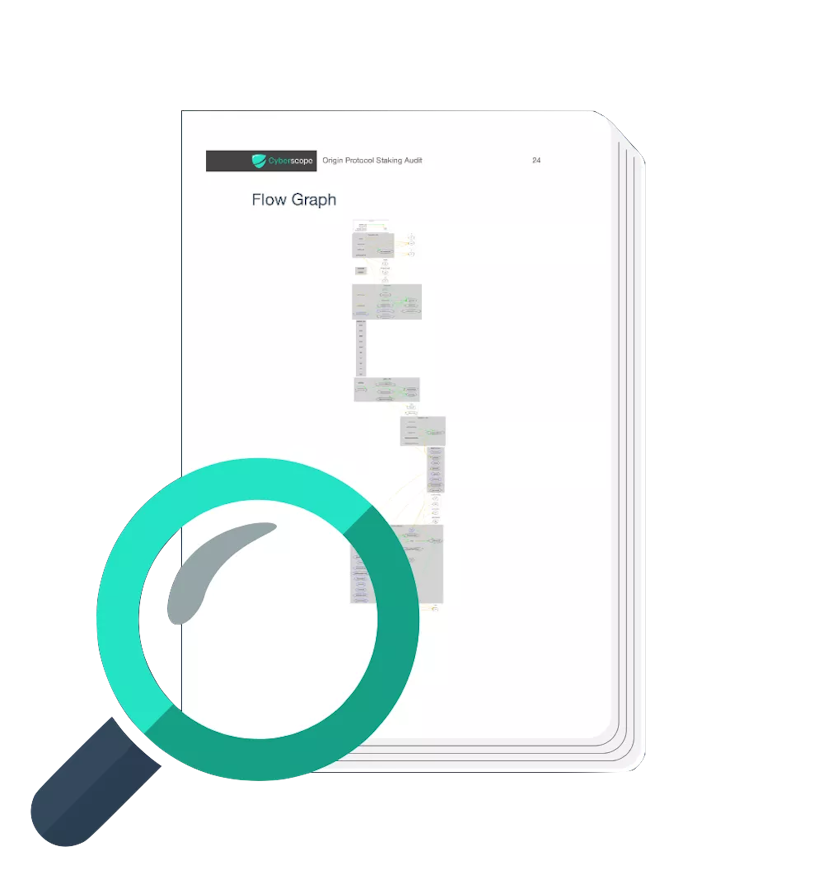Ethereum Smart Contract Audit
Get a professional Ethereum Smart Contract Audit to ensure the security and reliability of your code. Our comprehensive audit will identify potential vulnerabilities, optimize your code, address security concerns, and suggest improvements.
Request an AuditWhy is it Important to Audit an Ethereum Smart Contract?
By using an external team of experts, you can ensure that your contract has no critical bugs, vulnerabilities or security flaws.
Provides an unbiased third-party review of the code. With a thorough audit, it guarantees that your idea will be taken seriously by investors and partners alike.
Keeps your business and users safe from risk. If there are any problems with the functionality or security of your smart contract, it could put both you and others at risk!
Gives a detailed report on specific risks that developers may not have considered.

Bring Safety to your Investors!
Cyberscope helps you get your ideas out in a safer way without putting your business or your users at risk!
A Third Party Perspective
Developers may have overlooked security risks, they may not have understood the implications of certain code and they may have made mistakes in the code. You can help by auditing the contracts before they are deployed to the Ethereum Mainnet, Ropsten Ethereum Testnet, Kovan Ethereum Testnet, Ethereum Testnet or Goerli Ethereum Testnet.
The Value of Auditing
The main aim of smart contract audit is to ensure that your business does not face any risks associated with a faulty code. This can help you save time and money that is otherwise spent on fixing bugs and security flaws.

Work with us and join 3000+ satisfied customers!
Get a Free QuoteSmart Contract and Ethereum Blockchain
Smart contract is an emerging technology that is growing in popularity. A smart contract is a self-executing digital contract which facilitates the exchange of money, property or anything of value.
Smart contracts have been implemented on various blockchain platforms such as Ethereum blockchain. More and more companies are beginning to turn to blockchain to improve their existing processes and implement brand new ones. Smart contract audit is important for ethereum blockchain based businesses.
Ethereum is an open-source, public, blockchain-based distributed computing platform and operating system featuring smart contract (scripting) functionality. It supports a modified version of Nakamoto consensus via transaction based state transitions. Ethereum was proposed in late 2013 by Vitalik Buterin, a cryptocurrency researcher and programmer.
Development was funded by an online crowdsale that took place between July and August 2014. The system went live on 30 July 2015, with 11.9 million coins "premined". This accounts for about 13 percent of the total circulating supply in 2019.
An Emerging Technology that is Growing in Popularity
You may have heard of smart contracts or the Ethereum blockchain, but there's a lot to learn. Smart contract auditing is an important part of any business that is involved in the web3 and blockchain domain.
When you opt for a smart contract audit, you'll get the knowledge that will help you understand why an audit is so valuable and how it can benefit your business.
Smart contracts are computer programs that facilitate, verify, or enforce the negotiation or performance of a contract between two parties without requiring human intervention. A smart contract allows its participants to exchange money (or anything else of value) in a transparent way without relying on third parties like banks or other financial institutions.
More and More Companies are Turning to Blockchain
Blockchain is widely known as the technology behind cryptocurrency, but it is also a distributed ledger technology that is used for many different types of applications. Blockchain provides a way to create a shared database (for example, you can use blockchain to record transactions or store data) that multiple parties can trust and maintain in sync.
A blockchain database isn't stored in one place; rather, it's maintained by all participants in the network. Once data has been entered into the chain, it cannot be altered retroactively without altering all subsequent blocks—which would require enormous computing power.


